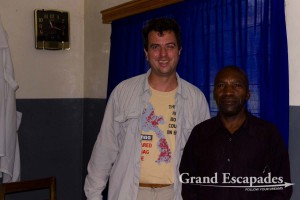1) The night after the gorilla trek, Gilles woke up in terrible pain. His left eye was swollen and awfully red. As soon as it got light we asked one of the awakening drivers to take us to the village hospital in Buhoma. Our arrival caught the only person on duty, a sturdy nurse, by surprise. She left to get help.
We waited in the doctor’s office, a two by two meter room, with a few pieces of old wooden furniture. Lots of faded sheets of paper tucked to walls and doors gave instructions as what to do when bricked by needles or how to recognize Ebola. The only items that reminded us of a hospital were neatly wrapped syringes. On two small cupboards it said “Medication”. Those were locked with a padlock. The strangest thing was a filing cabinet with lots of faded forms meant to transfer patients to labs or an x-ray, etc… Where could those facilities possibly be?
Another nurse came and left to bring eye drops, an ointment and pain killers. Luckily, Heidi read the instructions for the ointment: it said “Avoid contact with eyes and broken skin”. The awkward silence that followed was disrupted by loud drums and singing: a prayer by staff and patients, the daily ritual to start the day.
Once the drums stopped, an American doctor appeared out of nowhere and looked into Gilles eyes, confirming the medication he received and rushed off. On the way out, Heidi sneaked into the adjacent ward for in – patients, one for males, one for females. Only one patient was lying on a brown plastic – covered mattress put in a wooden bed frame. Given the basic facilities, we were just grateful that we received any help, especially since Gilles felt slightly better.
2) The same afternoon, by the time we reached our hotel at Queen Elisabeth National Park, Gilles was in severe pain. While Heidi racked her brain where to find a doctor in this remote rural area, a nicely dressed, competent looking gentleman was ushered into our room. Miraculously, the doctors of the very district were holding a meeting in our hotel. We could not believe our luck!
The doctor confirmed it was an acute conjunctivitis, declared the medication we had for useless and prescribed something new. We had not seen a pharmacy since we entered the country, but Heidi was driven to a small village.
The grey longish building that was pointed out showed no signs of being a pharmacy, clinic or doctor’s office. Then Heidi saw the same wooden beds, the same brown mattresses lurking from dark rooms. Was it somebody’s home or what? In the last room, an elderly woman sitting on a wooden crate was receiving an injection by a young man. The guy just nodded when Heidi showed the prescription and walked her to another unlit building where he unscrewed some big plastic jars and counted out various pills and an ointment. Heidi paid 2 USD and rushed the painkillers to Gilles. It was a private hospital.
3) Briefly things improved, but after one day Gilles’ vision was blurred. Our last resort was either driving back to Mbarara or to Kagando Hospital on the Congolese border. We chose the later, since it was more or less on our way north. Kagando is not even a village, just a cluster of houses. Despite the dramatic circumstances, we could not stop marveling at the beautiful scenery, the extremely fertile fields, the neat houses, and well-dressed, healthy looking villagers.
As soon as we walked through the hospital gate, Gilles was taken to the eye specialist, while Heidi lined up for the registration card that required identifying your tribe. The doctor’s office was not much different than the others.
A first test showed the vision of Gilles’ left eye was a mere 3, not the usual 10! Dr. Williams examined Gilles using an apparatus emitting ultra-violet. He showed Heidi a large undefined beige spot on Gilles iris, calling it an ulcer. We were both in shock! He turned over Gilles eye-lid and revealed the corpus deliciti for the suffering: a small wooden splinter stuck in a large, inflamed wound on the inside. This removed, new medication was prescribed plus vitamin A and we were on the road again.
Despite the basic facilities in all three clinics, people went overboard to help us and provide the best service possible under these conditions. Dr. Williams even called our driver days later to inquire about Gilles well – being.


No comments yet.